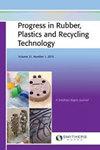利用计算机辅助设计/计算机辅助工程元素实现聚对苯二甲酸乙二醇酯水瓶的耐用性和可持续性
IF 1.6
4区 材料科学
Q4 MATERIALS SCIENCE, COMPOSITES
Progress in Rubber Plastics and Recycling Technology
Pub Date : 2024-05-31
DOI:10.1177/14777606241257043
引用次数: 0
摘要
处理塑料水瓶会造成环境污染和废物堆积。选择回收利用方案有助于减轻这些不利影响,并支持更可持续的废物管理方法。聚对苯二甲酸乙二醇酯是水瓶的主要成分。本研究的重点是水瓶设计模型,对其进行模拟,以复制在储存、运输和使用过程中遇到的应力。聚对苯二甲酸乙二醇酯水瓶成功地进行了应力分析,结果超过了所有规定要求,应力值低于屈服点,安全系数超过 1。这充分证明了该产品的卓越质量和承受最严苛条件的能力。分析进一步确定了不同情况下的峰值应力值(59.819、65.124 和 34.330 兆帕),指出水瓶的损坏可能超过 88.4 牛的临界垂直负载。因此,这种方法有助于减少废物,并解决与回收相关的环境挑战,包括资源和能源消耗、污染以及回收系统效率低下等问题。从本质上讲,这项研究是对可持续瓶子设计领域的重大贡献。它是为数不多的全面研究水瓶结构对耐久性和可持续性影响的研究之一。这项研究有可能在开发更环保的瓶子设计方面取得重大进展。本文章由计算机程序翻译,如有差异,请以英文原文为准。
Durability and sustainability of polyethylene terephthalate water bottles using computer aided design/computer aided engineering elements
Disposing of plastic water bottles contributes to environmental pollution and waste buildup. Choosing recycling options helps mitigate these adverse impacts and supports a more sustainable approach to waste management. Polyethylene terephthalate constitutes the primary component in water bottles. This study focuses on a water bottle design model, subjecting it to simulations that replicate stresses encountered during storage, transportation, and usage. Polyethylene terephthalate bottles successfully underwent stress analysis, surpassing all stipulated requirements, the results indicate stress values below the yield point and safety factors exceeding one. This affirms the product’s superior quality and its ability to withstand even the most rigorous conditions. The analysis further identified peak stress values (59.819, 65.124, and 34.330 MPa) in distinct scenarios, noting that the bottle may incur damage beyond the critical vertical load of 88.4 N. These findings underscore the efficacy of the proposed process in validating stresses in water bottles pre-manufacture. Consequently, this approach aids in waste reduction and addresses environmental challenges associated with recycling, including resource and energy consumption, contamination, and inefficiencies in recycling systems. In essence, this study constitutes a substantial contribution to the realm of sustainable bottle design. It stands out as one of the few comprehensive investigations into the structural impact on the durability and sustainability of water bottles. This research has the potential to emerge as a significant advancement in the development of more environmentally friendly bottle designs.
求助全文
通过发布文献求助,成功后即可免费获取论文全文。
去求助
来源期刊

Progress in Rubber Plastics and Recycling Technology
MATERIALS SCIENCE, COMPOSITES-POLYMER SCIENCE
CiteScore
4.40
自引率
7.70%
发文量
18
审稿时长
>12 weeks
期刊介绍:
The journal aims to bridge the gap between research and development and the practical and commercial applications of polymers in a wide range of uses. Current developments and likely future trends are reviewed across key areas of the polymer industry, together with existing and potential opportunities for the innovative use of plastic and rubber products.
 求助内容:
求助内容: 应助结果提醒方式:
应助结果提醒方式:


